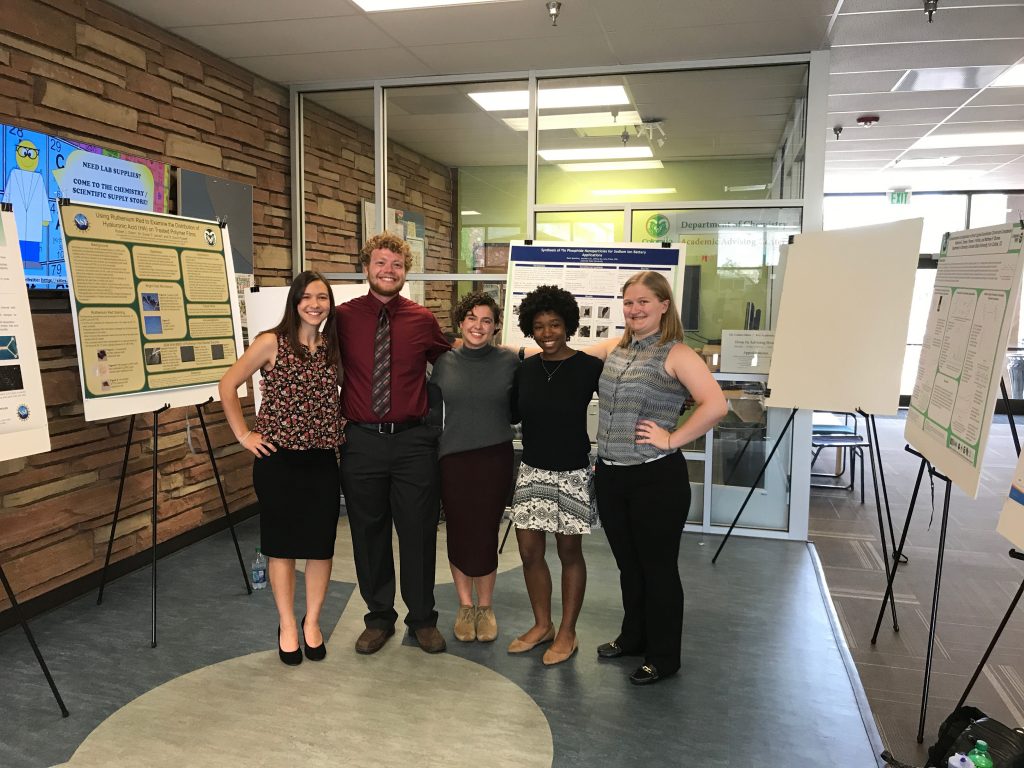
Program Description
We will support ~10 undergraduates from institutions outside of Colorado State University and several CSU undergraduates as they pursue independent research projects in chemistry, materials science and nanotechnology. Students will be involved in exciting cutting-edge projects. They will learn how to formulate and test hypotheses as well as perform experiments and computations, collect and analyze data, and develop interpretations for those results. During the course of these studies, the research participants will make use of state-of-the-art techniques and instrumentation available in our department.
The main focus of this 10-week summer program is the research that each undergraduate student performs under the guidance of a faculty mentor. Undergraduate student participants work in the faculty mentor’s laboratory and participate fully in the research group activities. Frequently, a graduate student or postdoctoral associate will mentor REU students in addition to regular contact with the faculty advisor.
REU Activities
Research Skills
- Library resources
- Research ethics
- Hiking
- Whitewater rafting
Presentation Skills
- Research group meetings
- REU group brown bag lunch meetings
- Capstone poster presentation
Career Building Activities
- Resume writing
- Career panel discussion
- Field trips to local industries/labs
Stipend
Students receive a stipend of at least $6,000 for the 10-week summer program. In addition, the program covers the cost of the double-occupancy modern dormitory accommodations with full board (worth an additional ~$2,500 for the summer).
Travel
The program offers a travel allowance of up to $600.
Housing
Students are housed in a residence hall on the Colorado State University campus with other summer undergraduate researchers from across campus.
Colorado State University and the Department of Chemistry
Colorado State University, Colorado’s land-grant institution, has an enrollment of more than 33,000 students and employs more than 400 faculty. More than 34 of those faculty conduct research in the Department of Chemistry, on a variety of topics in the traditional subdisciplines (analytical, inorganic, organic and physical) and in interdisciplinary areas such as chemical biology, materials and environmental chemistry. Materials science and nanotechnology research at CSU currently involves graduate students in over 40 individual research programs spanning six departments from the Colleges of Natural Sciences and Engineering. The NSF-sponsored REU undergraduates in this program work side-by-side with other undergraduates, graduate students, and postdoctoral associates in our modern, fully equipped chemistry laboratories.
Facilities
The Department of Chemistry at CSU houses a wide range of state-of-the-art equipment, both in individual and departmental laboratories. In particular, the Analytical Resources Core (ARC) includes an X-ray powder diffractometer, Raman and infrared spectrometers, a variable angle spectroscopic ellipsometer, thermal analysis (DSC, TGA) equipment, and an ultrahigh vacuum XPS for surface analysis. The CIF also houses a suite of NMR spectrometers and mass spectrometers as well as a well-equipped crystallography facility. Additionally, we have a well-equipped computer laboratory for computational projects.
Local Information
Fort Collins (population 144,000) lies 65 miles north of Denver, nestled along the foothills of the Rocky Mountains. Fort Collins has more than 300 days of sunshine per year with average summer temperatures ranging from 82 oF (high) to 52 oF (low). Fort Collins offers a wide range of recreational activities. The city has an extensive collection of public parks, tennis facilities, golf courses and bicycle paths. Recreation areas such as Rocky Mountain National Park, Cache la Poudre Canyon, Lory State Park, Horsetooth Mountain Park, and the Roosevelt National Forest are within an hour’s drive. A wide variety of entertainment programs, festivals and outdoor concerts are held throughout the summer.
